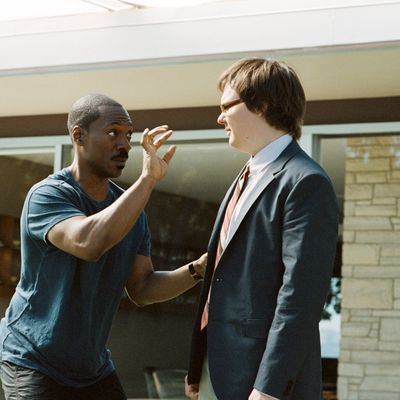
Does Eddie Murphy actually have any range, or is it just an illusion created by a few early edgy roles and, later, a lot of CGI makeup and fat suits? In A Thousand Words, the comedian doesnÔÇÖt do his usual thing of playing multiple parts (├á la Dr. Doolittle or The Nutty Professor), but he does have to run the full gamut of shtick, as he is transformed from ├£ber-con fident motormouth to hapless victim of karmic circumstance to earnest Changed ManÔäó. But his performance feels so disingenuous, so forced, that an otherwise perfectly acceptable high-concept comedy comes crashing down around him.
Murphy plays Jack McCall, a powerful book agent and neglectful family man who prides himself on his powers of coercion and his total lack of genuine interest in the product he pimps. (ÔÇ£All your best books have everything you need in the first five pages and the last five pages,ÔÇØ he smugly tells his hard-working assistant, played by Clark Duke.) Attempting to sign a popular guru (Cliff Curtis) who has reportedly written a book, Jack lies a little too much and, before he knows it, a mysterious tree has sprouted in front of his house. Jack, it turns out, has become one with the tree: A leaf falls with every word he utters, so that when all the leaves are gone and the tree has died, so will he. (Never mind the fact that trees donÔÇÖt die when all their leaves are gone, but whatever.) In other words, our alpha male can no longer use his voice ÔÇö not to negotiate a deal with Random House, not to sign a new client, not to bond with his son, not even to tell his wife (Kerry Washington) he loves her when she tries to interest him in a little S&M (no, really). Every once in a while he blurts out something, but most of the time Jack has to make do with silent buffoonery. In one of the filmÔÇÖs funnier scenes, Jack McBrayer shows up as a Starbucks barista who tries to follow our heroÔÇÖs elaborate, charadeslike order. Thus do the mighty understand the consequences of their words.
Really, itÔÇÖs a cute idea, and you imagine that at one point a film like this might have marked MurphyÔÇÖs return to form. (It has reportedly sat on a shelf for the last several years, a victim of the various legal entanglements between Dreamworks and Paramount.) It could have been a clever, Liar LiarÔÇôlike blend of physical humor and audience-friendly messaging. But all those years of acting opposite animals and CGI effects for the kiddies appear to have taken their toll on the actor: He hams it up to such an unnatural degree that he scrubs every moment clean of wit or charm. HeÔÇÖs trying so hard to make us laugh that we feel almost afraid to.
To be fair, the movie gives him a lot to do, and Murphy still has a lot of energy: One moment heÔÇÖs a slick power player, the next moment heÔÇÖs a nervous chatterbox trying to weasel his way out of an awkward lie. Even when dealing with his supernatural/moral conundrum, he has to veer between confident duplicity and wide-eyed helplessness. But he steamrolls every scene with his mugging, and itÔÇÖs hard to reconcile this exhausting, cartoonish display with the jaded Murphy of yore, who was just above it all enough to charm our way onto his side. Now he merely alienates us. And that makes A Thousand Words another in a line of dispiriting failures ÔÇö a star vehicle where the star ruins the movie.


